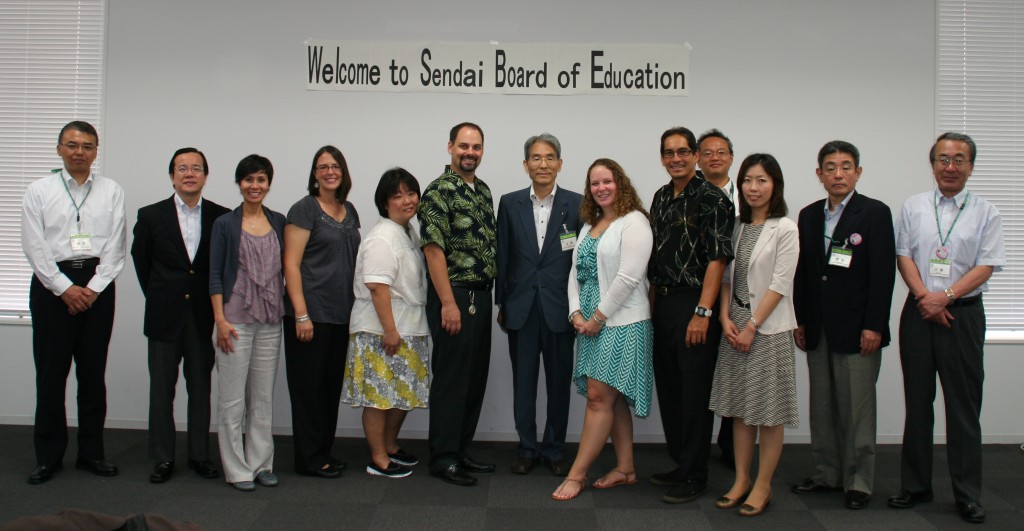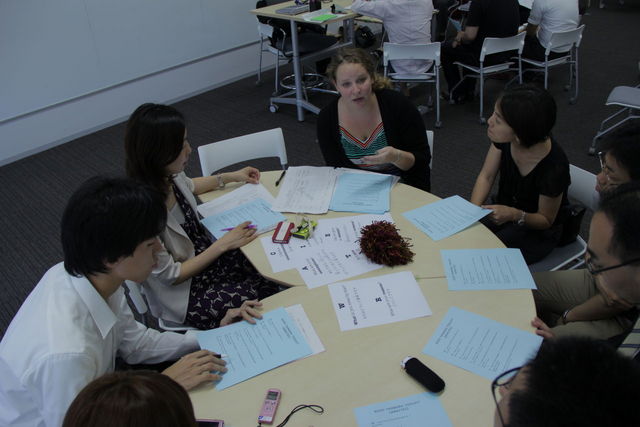- International Exchanges
The UH Uehiro Academy hosts and participates in international exchanges among educators and researchers, with a dedicated focus to Japan-Hawai‘i connections. p4c Hawai‘i has hosted teachers, professors, and students from Austria to Kazakhstan and is currently hosting a visiting scholar from Hiroshima University. While the UH Uehiro Academy always welcomes visitors, we focus on three exchanges each year. Since 2008, the Uehiro Foundation on Ethics and Education in Tokyo has generously hosted p4c Hawai‘i teachers in Japan each summer to conduct workshops, demonstrate p4c lessons, and meet with teachers, university faculty, administrators, and government officials. In turn the UH Uehiro Academy welcomes visiting elementary and junior high school teachers from Japan each August. These visiting teachers demonstrate moral education lessons and learn about p4c Hawai‘i from teachers and UH faculty. Additionally, each spring we welcome interested university faculty and graduate students from Japan to learn about p4c Hawai‘i theory and practices. Each of these exchanges is made possible through the effort and guidance of Dr. Mitsuyo Toyoda and the generous support of the Uehiro Foundation.


- K-12
We work with students and teachers in our public schools to help create a more thoughtful, compassionate, and ethical educational experience. Currently there are three p4c Hawai‘i “model schools” and many individual teachers committed to integrating the activity of philosophy into their classrooms. Our dream is to cultivate a K-12 philosophical schooling experience that encourages students to think collaboratively about meaningful topics and questions.
- Higher Education
The UH Uehiro Academy’s initiatives in higher education focus on courses at the University to enhance understanding of p4c Hawai’i and the theoretical and applied aspects of the approach. Philosophy with Children (PHIL 492) serves as an introductory course to philosophy for children Hawai‘i and examines the theory and practice of doing philosophy in elementary, middle, and high school classrooms. Teaching Philosophy (PHIL 493) is a supervised practicum in elementary, middle, and high school classrooms for students who wish to learn how to facilitate philosophical inquiry with students. Philosophy of Childhood (PHIL 725) is a graduate level course focusing on the conceptual interrelations among philosophy, childhood and education. PHIL 699 is a directed readings course on specific topics related to both the theory and practice of p4c Hawai’i.
- Research
One of the main goals of the University of Hawai‘i Uehiro Academy for Philosophy and Ethics in Education (Uehiro Academy) is to prepare, support and sustain p4c Hawai‘i research and researchers. p4c Hawaii research includes both formal and informal studies aimed at investigating the theoretical and practical aspects of a p4c approach to education. p4c Hawai‘i researchers are faculty and students at the University of Hawai‘i, p4c Hawai‘i classroom practitioners, visiting international scholars, and research partners at various institutions worldwide.
Current Uehiro Academy research initiatives include:
- “The Kailua High School Philosophical Inquiry Longitudinal Study”
- Creating a quantitative scale for measuring the impact of p4c Hawai‘i on student learning
- p4c Hawai‘i model school pre and post assessments
- UH Manoa, College of Education Masters Theses and Doctoral Dissertations
- Visiting international scholar research investigating the relationship between p4c Hawai‘i and citizenship education
- Professional Development
The Uehiro Academy offers classes, workshops, and ongoing support (such as a Philosopher in Residence) to teachers who aim to incorporate philosophy, specifically p4c Hawai‘i, into their classroom practice. These professional development opportunities provide teachers with an educative experience that promotes a new understanding of the teacher-student relationship, creates a shift in the primary content of instruction, and develops methods to engage students in meaningful philosophical reflection.
- Outreach
In addition to its work in school classrooms, the UH Uehiro Academy reaches out into the community in a variety of ways. The UH Uehiro Academy maintains ongoing partnerships with the Japan-America Institute of Management Science (JAIMS), the PALS and PLACES projects on the Wai‘anae coast, the Hawaii State Legislature, and the Rotary Club of Hawai‘i. Initiatives currently being developed include working with Ala Wai and Waimanalo Schools to integrate p4c Hawai‘i into their counseling departments, developing the High School Legislative Internship Program Pilot, incorporating p4c Hawai‘i into art instruction at the Honolulu Museum of Art, and offering p4c Hawai‘i classes for youth at the University of Hawai‘i, Mānoa.
- Curriculum
The Uehiro Academy for Philosophy and Ethics in Education produces and supports the development of curriculum related to a p4c Hawai‘i approach to education. Students and teachers in traditional K-12 school settings, higher education, and other innovative educational programs and initiatives use the p4c Hawai’i curriculum designed by the Uehiro Academy. Curriculum development at the Uehiro Academy is a collaborative process. University of Hawai‘i faculty work with teachers and students to brainstorm, implement and reflect on new ways of incorporating community, inquiry, philosophy, and reflection into a wide array of subject areas and diverse community contexts.
One example of a current Uehiro Academy curriculum development project is Philosophical Inquiry. Philosophical Inquiry is a new social studies course being piloted in the Hawai‘i State Department of Education (HI DOE) at Kailua High School (KHS). This curriculum provides students with opportunities to develop the skills and processes necessary for achieving 21st century student outcomes (as outlined in the P21 Framework, 2009), such as:
- Complex problem solving, critical thinking, good judgment, reasoning, inter-personal communication, personal reflection, group facilitation, note-taking, and writing skills
- Ethical relationship building, and dispositions necessary for thinking responsibly as a member of a reflective community of inquiry
- Interdisciplinary methods for conducting research
- Thinking philosophically about historical, economic, geographic, and political science content, issues and concepts
- Engaging student wonderment in the learning process and connecting thinking across content areas and other areas of life
- Developing the habits of mind needed for meaningful and purposeful engagement in their current and future schoolwork and life


